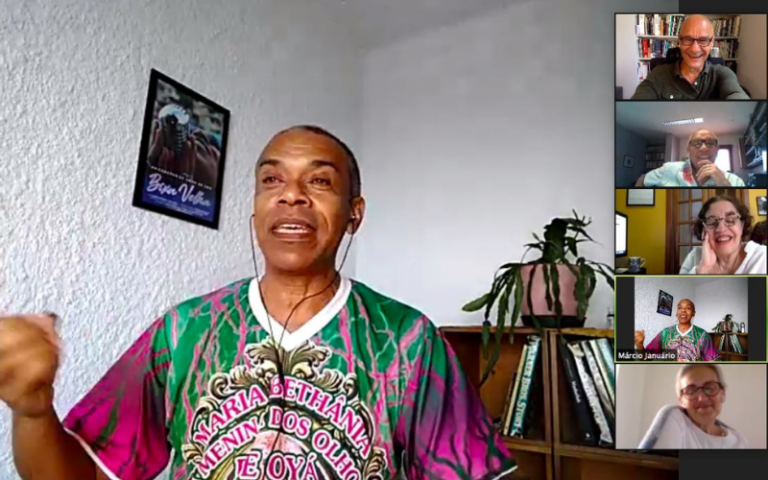Translating contemporary Afro-Brazilian Literature
Dr Ana Cláudia Suriani da Silva collaborated with authors and translators to get more Afro-Brazilian literature on the syllabus for the study of both Brazilian literature and Portuguese language.

16 June 2022
There is a lack of material on Afro-Brazilian literature that has been translated into English, which makes it difficult to teach the work of both established and up-and-coming authors in this field. Students studying Portuguese at UCL have an opportunity to study a module called ‘Afro-Brazilian Literature in Translation’, and teaching staff wanted to broaden the material they could give students access to.
As a result, Ana (UCL School of European Languages, Culture and Society, SELCS) used Global Engagement Funds to collaborate with the State University of Rio de Janeiro (UERJ) and the organisers of FLUP (Festa Literária das Periferias / Literary Festival of the Peripheries). FLUP is an international literary festival designed to affirm the favela as a legitimate space for literary debate and creativity. FLUP has been running in the favelas of Rio de Janeiro since 2012, focused on widening the reach of literature and providing opportunities in literature to marginalised voices. UCL’s collaboration with these partners aimed to connect students, translators and communities with a range of authors involved in Afro-Brazilian literature.
Translation workshops for all
“I teach the ‘Afro-Brazilian Literature in Translation’ module at UCL,” explained Ana, “ but there is a significant lack of material in English. UCL is committed to research-led learning, decolonising the curriculum and opening the classroom up to the community, and this is where the idea of the research project grew from.”
Together with her collaborators, Ana arranged a series of 10 online translation workshops, with one workshop held every two weeks for approximately five months. For each workshop, the team invited one well-known, established Afro-Brazilian author and one newcomer in the genre. They were joined by Portuguese and English translators and UCL students, as well as anyone who was interested in the project. A total of 1,000 people signed up.
“The idea was to use the structure of my teaching, based on extracts of source texts that are translated,” explains Ana. “But instead, the texts would be short stories written by contemporary Afro-Brazilian authors. The workshops involved dialogue between translators and authors, also providing learning opportunities for our students.” Ana describes translation as the “fifth skill” of language learning, sitting alongside reading, writing, listening and speaking. “Through the workshops, UCL students could interact in a collective translation process.”
Making language and literature more accessible
The project was described as a resounding success by those who participated. It enabled the work of Afro-Brazilian authors to travel further, while UCL students benefited from learning through interaction and accessing exciting new material. “The workshops promoted translation as a collaborative activity, helping to develop translators in both the UK and Portuguese speaking countries,” Ana says. She also describes how people from many countries and all walks of life joined the free workshops, brought together by their shared interest in language and literature. “The regular interaction during the pandemic was also appreciated by the participants,” says Ana.
Following the project, Ana submitted a proposal to UCL Press for a bilingual anthology of short stories. The proposal was accepted, and will include the 10 short stories written by the Afro-Brazilian authors for this project, plus a further 13 short stories that have been submitted. All the short stories will be published in both Portuguese and English, and the publication will be open access.
Ana describes how a lot of good has come from the project. “The UCL Global Engagement Funds enabled us to pay the authors and translators who took part in the project,” says Ana. “It means a lot to be able to properly recognise their work.” Ana was also able to get all the material from the workshops transcribed thanks to the funds. “I have so much data now, which can be used in my teaching, and is already being supplied to students who choose some of the workshop topics for their essays.”
For her own personal and professional development, the project also sparked many rewards for Ana. “Afro-Brazilian literature was not on the curriculum when I did my degree in Brazil,” Ana explains. “This gave me an opportunity to get in touch with what is being produced in Brazil at the moment. It supported my development as a lecturer as well, allowing me to update a syllabus and include contemporary authors.”
Ana was also pleasantly surprised by the response she got from the wider higher education teaching community. “The project promoted the work we do at SELCS – including teaching translation, Portuguese language and Brazilian literature – within the universities that teach these subjects,” Ana says. “Portuguese is a fairly new subject in SELCS, compared to other universities in the UK. This project put us on the map; they know who we are now.”
Links
- SELCS Brazilian Translation Club
- FLUP
- Background reading: Rio de Janeiro festival brings literature to favelas (BBC News)
- Image: Screenshot of online workshop Love led by Marcio Januario
For the latest news about UCL’s international activity, partnerships and opportunities, subscribe to our bimonthly Global Update newsletter.
 Close
Close

